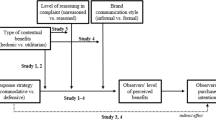Abstract
The current research draws scholars’ attention to the need to further investigate framing effects in the context of online complaining. While much research has been conducted on the topic of service recoveries via social media (e.g., Weitzl et al. 2018), little is known about consumers’ reactions to corporate responses which apply either (positive/negative) attribute or goal framing. This research is one of the first to shed light on the special case of individuals (i.e., complaint observers) who witness a dissatisfied customer’s public online complaint and the framed response by the company involved in a product/service failure.
We know that many consumers source product information from fellow shoppers online (i.e., electronic word-of-mouth (eWOM)) before making a purchase and that the way companies react to overt online criticism (i.e., negative eWOM) is critical for the observers’ ultimate purchasing decision. Research suggests that framing these corporate responses in a certain way can strongly influence observers’ attitude towards the company (e.g., Her and Seo 2017; Tran et al. 2020). However, some of the existing conclusions have to be revised in the light of the present study: First, in contrast to the assumingly very robust valence-consistent influences for attribute framing (i.e., positive framing – such as “We give you a voucher, with which you will safe 90% of the total amount at your next visit.” – is more favored than negative framing – such as “We will give you a voucher, with which you will only 10% of the total amount at your next visit.”), this research shows that also negative framing can have similar effects. Second, we further show that for goal framing, a positive valence conveyed in the recovery message is more effective than a negatively framed information. This means that in the current research context (i.e., low involvement consumer decisions) a ‘positivity bias’, where the positively framed goal is perceived as a sincere apology, is more likely than the regularly assumed ‘negativity bias’. These insights suggest that in terms of framing effects, scholars should consider the specific boundary conditions given in the context of online complaining.
Access this chapter
Tax calculation will be finalised at checkout
Purchases are for personal use only
Similar content being viewed by others
Author information
Authors and Affiliations
Corresponding author
Editor information
Editors and Affiliations
Rights and permissions
Copyright information
© 2022 The Author(s), under exclusive license to Springer Nature Switzerland AG
About this paper
Cite this paper
Weitzl, W.J., Zniva, R., Petz, G., Pichler, C. (2022). An Apology Is More Than Just Saying “Sorry”: Framing Effects in Online Service Recoveries: An Abstract. In: Allen, J., Jochims, B., Wu, S. (eds) Celebrating the Past and Future of Marketing and Discovery with Social Impact. AMSAC-WC 2021. Developments in Marketing Science: Proceedings of the Academy of Marketing Science. Springer, Cham. https://doi.org/10.1007/978-3-030-95346-1_2
Download citation
DOI: https://doi.org/10.1007/978-3-030-95346-1_2
Published:
Publisher Name: Springer, Cham
Print ISBN: 978-3-030-95345-4
Online ISBN: 978-3-030-95346-1
eBook Packages: Business and ManagementBusiness and Management (R0)




